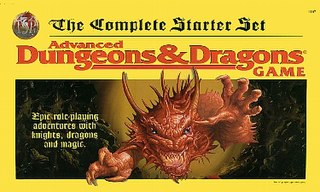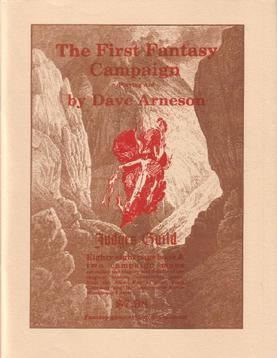Related Research Articles

A role-playing game is a game in which players assume the roles of characters in a fictional setting. Players take responsibility for acting out these roles within a narrative, either through literal acting or through a process of structured decision-making regarding character development. Actions taken within many games succeed or fail according to a formal system of rules and guidelines.

A campaign setting is a setting for a tabletop role-playing game or wargame campaign. Most campaign settings are fictional worlds; however, some are historical or contemporary real-world locations. A campaign is a series of individual adventures, and a campaign setting is the world in which such adventures and campaigns take place. A campaign setting is typically designed for a specific game or a specific genre of game, though some come from existing media. There are numerous campaign settings available for purchase both in print and online. In addition, many game masters create their own, which are often called "homebrew" settings.

Keith Baker is an American game designer and fantasy novel author. In addition to working with Wizards of the Coast on the creation of Eberron, he has also contributed material for Goodman Games, Paizo Publishing and Green Ronin Publishing. In 2014, Baker and Jennifer Ellis co-founded the indie tabletop game company Twogether Studios.

Empire of the Petal Throne is a fantasy role-playing game designed by M. A. R. Barker, based on his Tékumel fictional universe. It was self-published in 1974, then published by TSR, Inc. in 1975. It was one of the first tabletop role-playing games, along with Dungeons & Dragons, and was the first published RPG game setting. Over the subsequent thirty years, several new games were published based on the Tékumel setting; however, to date, none have met with commercial success. While published as fantasy, the game is sometimes classified as science fantasy or, debatably, as science fiction.

The history of role-playing games began when disparate traditions of historical reenactment, improvisational theatre, and parlour games combined with the rulesets of fantasy wargames in the 1970s to give rise to tabletop role-playing games (TTRPGs). Multiple TTRPGs were produced between the 1970s and early 1990s. In the 1990s, TTRPGs faced a decline in popularity. Indie role-playing game design communities arose on the internet in the early 2000s and introduced new ideas. In the late 2010s and early 2020s, TTRPGs experienced renewed popularity due to videoconferencing, the rise of actual play, and online marketplaces.

Role-playing games (RPGs) have developed specialized terminology. This includes both terminology used within RPGs to describe in-game concepts and terminology used to describe RPGs. Role-playing games also have specialized slang and jargon associated with them.

An indie role-playing game is a role-playing game published by individuals or small press publishers, in contrast to games published by large corporations. Indie tabletop role-playing game designers participate in various game distribution networks, development communities, and gaming conventions, both in person and online. Indie game designer committees grant annual awards for excellence.
Paizo Inc. is an American role-playing game publishing company based in Redmond, Washington, best known for the tabletop role-playing games Pathfinder and Starfinder. The company's name is derived from the Greek word παίζωpaizō, which means 'I play' or 'to play'. Paizo also runs an online retail store selling role-playing games board games, comic books, toys, clothing, accessories and other products, as well as an Internet forum community.

Graeme Davis is a game designer, writer, and editor in the tabletop role-playing game industry.

Robert J. Schwalb is a writer in the role-playing game industry, and has worked as a game designer and developer for such games as Dungeons & Dragons, A Song of Ice and Fire Roleplaying, Warhammer Fantasy Roleplay, Shadow Of The Demon Lord, and many other RPG supplements.

Ray Winninger is a game designer who has worked on a number of roleplaying games, including the Dungeons & Dragons fantasy roleplaying game. He is the former Executive Producer for the Wizards of the Coast Dungeons & Dragons studio.

A tabletop role-playing game, also known as a pen-and-paper role-playing game, is a classification for a role-playing game (RPG) in which the participants describe their characters' actions through speech and sometimes movements. Participants determine the actions of their characters based on their characterization, and the actions succeed or fail according to a set formal system of rules and guidelines, usually involving randomization. Within the rules, players have the freedom to improvise, and their choices shape the direction and outcome of the game.

Powered by the Apocalypse (PbtA) is a tabletop role-playing game design framework developed by Meguey Baker and Vincent Baker for the 2010 game Apocalypse World and later adapted for hundreds of other indie role-playing games.
Cam Banks is a game designer known for his work on the Cortex System line of roleplaying games as lead designer for Marvel Heroic Roleplaying, and the Big Damn Heroes Handbook supplement to the Serenity Role Playing Game, among other titles. He is the Cortex Creative Director for Fandom Tabletop, the publishers of Cortex Prime.

Roll20 is a website consisting of a set of tools for playing tabletop role-playing games, also referred to as a virtual tabletop, which can be used as an aid to playing in person or remotely online. The site was launched in 2012 after a successful Kickstarter campaign. The platform's goal is to provide an authentic tabletop experience that does not try to turn the game into a video game, but instead aids the game master in providing immersive tools online. The blank slate nature of the platform makes integrating a multitude of tabletop role-playing games possible.
Shannon Appelcline is a historian of tabletop role-playing games and a game designer. Two different editions of his book Designers & Dragons have won ENNIE Awards.

The Dungeons & Dragons Starter Set is a category of companion accessories across multiple editions of the Dungeons & Dragons fantasy role-playing game. In general, the Starter Set is a boxed set that includes a set of instructions for basic play, a low level adventure module, pre-generated characters, and other tools to help new players get started.

The First Fantasy Campaign is a supplement for fantasy role-playing games written by Dave Arneson and published by Judges Guild in 1977.
Avatar Legends: The Roleplaying Game is a fantasy tabletop role-playing game produced by Magpie Games. It is set in the world of the animated television series Avatar: The Last Airbender and The Legend of Korra, and takes place in five different time periods. Players take the roles of martial artists, technological experts, or benders – people who can manipulate one of the four classical elements – who fight for balance in the world while also working towards their own goals and struggling with inner balance, represented by opposing ideals held by a character.
Grant Howitt is a tabletop role-playing game designer, publisher, and journalist. He won six ENNIE Awards for his game Heart: The City Beneath. His game Honey Heist, which inspired an online trend of self-published games with one-page rulesets, has been featured on Critical Role, The Adventure Zone, and Friends at the Table. Through his publishing company Rowan, Rook and Decard, Howitt is a co-designer on Kieron Gillen's DIE: The Roleplaying Game.
References
- 1 2 Schallegger, René Reinhold (2018). The Postmodern Joy of Role-Playing Games: Agency, Ritual and Meaning in the Medium. Jefferson, North Carolina: McFarland & Company. ISBN 978-1-4766-3146-2 . Retrieved 2024-03-24– via Google Books.
- 1 2 Zagal, José P.; Deterding, Sebastian, eds. (2018). Role-Playing Game Studies: Transmedia Foundations. New York: Routledge. ISBN 978-1-138-63890-7 . Retrieved 2024-03-24– via Google Books.
- 1 2 Williams, Matthew Ryan (2019-07-13). "Everything You Ever Wanted to Know About Tabletop RPGs". Wired . Archived from the original on 2024-03-24. Retrieved 2024-03-24.
- 1 2 Carbonell, Curtis D. (2019). Dread Trident: Tabletop Role-Playing Games and the Modern Fantastic. Liverpool: Liverpool University Press. p. 2. ISBN 978-1-78962-057-3 . Retrieved 2024-03-24.
- 1 2 Nikolaidou, Dimitra (2020). "The Wargame Legacy: How Wargames Shaped the Roleplaying Experience from Tabletop to Digital Games". In Hammond, Phil; Pötzsch, Holger (eds.). War Games: Memory, Militarism and the Subject of Play. New York: Bloomsbury Publishing. ISBN 978-1-5013-5115-0 . Retrieved 2024-03-24– via Google Books.
- 1 2 "2012 Nominees and Winners – ENNIE Awards" . Retrieved 2024-10-23.
- 1 2 "2015 Nominees and Winners – ENNIE Awards" . Retrieved 2024-10-23.
- ↑ Leaman, Troy (2016). "Playing for Change: FreeMarket and the Rise of Serious Tabletop Role-Playing Games". In Byers, Andrew; Crocco, Francesco (eds.). The Role-Playing Society: Essays on the Cultural Influence of RPGs. Jefferson, North Carolina: McFarland & Company. p. 205. ISBN 978-0-7864-9883-3 . Retrieved 2024-03-24– via Internet Archive.
- ↑ Holleman, Patrick (2019). Reverse Design: Diablo II. Boca Raton, Florida: CRC Press. ISBN 978-0-429-83410-3 . Retrieved 2024-03-24.
- ↑ Caffrey, Jr., Matthew B. (2019). On Wargaming: How Wargames Have Shaped History and how They May Shape the Future. Newport, Rhode Island: Naval War College Press. p. 126. ISBN 978-1-935352-65-5 . Retrieved 2024-03-24.
- ↑ Nachtwey, Gerald (2021). Strictly Fantasy: The Cultural Roots of Tabletop Role-Playing Games. Jefferson, North Carolina: McFarland & Company. pp. 12–13. ISBN 978-1-4766-7571-8 . Retrieved 2024-03-24– via Google Books.
- ↑ Riggs, Ben (2022). Slaying the Dragon: A Secret History of Dungeons & Dragons. New York: St. Martin's Press. ISBN 978-1-250-27804-3 . Retrieved 2024-03-24– via Google Books.
- ↑ Horvath, Stu (2023). Monsters, Aliens, and Holes in the Ground, Deluxe Edition: A Guide to Tabletop Roleplaying Games from D&D to Mothership. Cambridge: MIT Press. ISBN 978-0-262-04822-4 . Retrieved 2024-03-24– via Google Books.
- ↑ Munise, Benjamin Joseph (2023-05-24). Roleplaying Games and Performance (PhD thesis). Louisiana State University. p. 16. Archived from the original on 2024-03-24. Retrieved 2024-03-24.